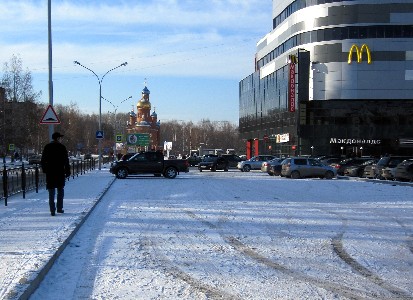To «скучать» [be bored] or to «скучать» [miss] – that is THE question! Posted by josefina on Dec 18, 2009 in language
Only two weeks away from the Motherland and it is already time for the usual confession: «я скучаю по России» [I miss Russia]! But that’s not all – also «я скучаю по русской зиме, по русскому снегу…» [I miss the Russian winter, the Russian snow…]. At least I have thousands of photos of Russia dressed in snow like the one above on my computer and looking at them helps me escape «скучная шведская реальность» [the dreary Swedish reality] for a while…
When learning a new language you’ll sooner or later find yourself forced to face the unsettling linguistic phenomena of words that have more than just ONE meaning. The word «траур» which can mean both ‘mourning’ and ‘sables’ is one of the less troublesome cases (not all dictionaries even list the translation ‘sables’) because it is not often you’ll actually risk mixing up these two meanings. When you’re learning new words with only two meanings you can consider yourself lucky, at other times you’ll meet words with three or even more meanings. It can be confusing since you won’t always be sure if you’re using the word correctly. «Не страшайся!» [Don’t fear/dread!] but convince yourself instead that you’re brave enough to risk it and that you can do it. Let’s have a look at the verb «скучать» today. This verb is imperfect and has two possible meanings: 1) to be bored; 2) to miss. The key to make sure you’re using this verb properly when you put it in a sentence is to know your prepositions. If you want to use «скучать» in the sense of ‘God, I’m so bored!’ then you need not use any preposition at all. As a matter of fact, if you want to it to express boredom, then never use a preposition after it:
«Боже, я так скучаю!» – [God, I’m so bored!]
Although Russians prefer to use the following impersonal construction when telling you they’re bored (do note that both sentences translate into English in the same way):
«Боже, мне так скучно!» – [God, I’m so bored!]
If you’re not aiming for an expression of «скука» [boredom; tedium], but wanting to communicate missing something as in a lighter form of «тоска» [anguish; ennui; depression, melancholy; yearning, longing for], you should use the most versatile preposition «по» [on; along; over; by; through; in; up; around; about]. When you use this preposition together with the verb «скучать» make sure that it is followed by an object «в дательном падеже» [in the dative case]:
«скучать по чему-то, по кому-то» – [to miss something, somebody].
«Он скучает по Родине» – [He misses his motherland (native country, the country in which he was born)].
«Мы скучаем по дому» – [We’re homesick (we miss our home life)].
But don’t let yourself be limited by just one preposition! You can also use «о» [(also: «обо») about, of, regarding; on, upon; over; against] as long as you don’t mix it up with the previous preposition, but place the object after it «в предложном падеже» [the in prepositional case] and you’ll be able to make it something like «скучать о ком-то» [to miss somebody]:
«Ты не скучаешь обо мне?» – [Don’t you miss me?]
«Они скучают о вас» – [They miss you (plural)].

«Скучно на этом свете, господа!» [It is boring on this earth, (ladies and) gentlemen!]
I know you’ve probably heard this «крылатое выражение» [winged expression] above many times before – and it always the first thing that comes to my mind when I think of boredom in Russian – but where is it from? It is from the end of the famous novella «Повесть о том, как поссорился Иван Иванович с Иваном Никифоровичем» [“The Tale of How Ivan Ivanovich Quarreled with Ivan Nikiforovich”] by everybody’s favorite Ukrainian born Russian writer «Николай Васильевич Гоголь» [Nikolai Vasil’evich Gogol]. The year of 2009 belonged rightly to him – 200 years after his birth – and all of the celebrations had many people wondering: “Has anything at all happened in Russia since Gogol?” And many more people answering: «Видимо нет…» [Apparently not…] What do you think? What would Gogol do, had he lived and worked as a writer in today’s Russia? Would he have written «Мёртвые души» [“Dead Souls“] and «Ревизор» [“The Inspector General“] in today’s Russian society even «двадцать лет после перестройки» [twenty years after perestroika]?

Build vocabulary, practice pronunciation, and more with Transparent Language Online. Available anytime, anywhere, on any device.





Comments:
marina:
Nice! I’ve probably never paid attention to people saying “скучать о / обо”… Now I know!
Loved your blog! 🙂
Pau;:
Josefina,
the blog of blogs for people who love Russia (and, like myself, try to speak a little Russian).
Being Dutch, the word траур, is not a ‘new’ word. In Dutch the equivalent is ‘trouwer’, almost pronounced the same way. Oh, that Peter guy, who loved Holland so much! Hard to believe though that Russia did not have траур before Peter the Great, go wonder!
Thank you for your blog.
Peggy:
Firstly, once again, I love your blog – it brightens my day when it arrives.
A very minor pedantic point – phenomenon is the singular, phenomena is plural so ‘ linguistic phenomena ‘ is not strictly speaking accurate (though you will find it wrongly used in English newspapers for instance).
I do admire your language abillity; I only wish I had learned Russian earlier – it is so hard to retain the new words and the grammar, no matter how often I repeat and relearn: please carry on blogging as long as you can! Peggy
Josefina:
Thank you, Peggy! I make mistakes both in Russian and English, and I’m always happy when someone tells me about them 🙂 I will correct it!
Svetlana:
One more little comment then. 🙂
«Не страшайся!» does not sound Russian at all – we would say “не бойся!” or “не страшись!”, with the latter being less common than the former.
Elizabeth H. (Russia):
It always confuses me when someone says “Не скучай!” Does it mean “don’t be bored,” or “don’t be lonely”?
Saint Facetious:
Ha, I’ve used that word often but never thought to use a preposition (so, I’ve been using it wrong and nobody thought of correcting me!). Good thing to know, thanks!
Stas:
Sometimes you may hear people say, “Я скучаю ЗА тобой…” However, it is not a correct way to say. Usually it is people whose first language is Ukranian or who lived in Ukraine for some time speak this way.